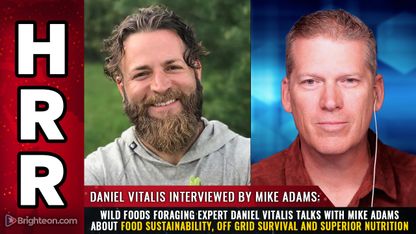
The team evaluated over 5,800 foods, ranking them by their nutritional disease burden to humans as well as their impact on the environment. They found that substituting 10 percent of daily caloric intake from beef and processed meats for a mix of fruits, vegetables, nuts, or seafood could reduce the dietary carbon footprint by a third, and allow people to gain 48 healthy minutes per day.
Katerina Stylianou, Director of Public Health Information and Data Strategy at the Detroit Health Department and part of the research team from U-M said that dietary recommendations lack specific and actionable direction to motivate people to change their behavior. They also rarely do dietary recommendations to address environmental impact. (Related: Health Basics: Is there any food in our food?)
Developing a new nutritional index for food
The study is based on a new epidemiology-based nutritional index called Health Nutritional Index (HENI), which the researchers developed in collaboration with a nutritionist from Nutrition Impact, LLC.
HENI calculates the net beneficial or detrimental health burden in minutes associating them with the serving of food consumed.
The index was adapted from the Global Burden of Disease, an index that associates single food choices with disease mortality and morbidity. For HENI, the researcher used the 15 dietary risk factors and disease burden estimates and combined them with the nutrition profiles of the food consumed in the U.S. Food with positive scores and healthy minutes to life, while those with negative scores are associated with outcomes considered detrimental.
The researchers also evaluated the environmental impact of foods by utilizing a method that assesses their life cycle impact -- from production, processing, manufacturing, preparation or cooking, consumption and waste -- and added improved assessments for water use and human health damages. They also developed scores for 18 environmental indicators, which took into account detailed food recipes and food waste.
Finally, the researchers classified foods into three color zones based on their combined nutritional and environmental performances.
On one end of the spectrum is the green zone, which represents food recommended to increase in one's diet as they are both nutritionally beneficial and have low environmental impacts like nuts, fruits, vegetables, whole grains, and seafood.
The opposite end of the spectrum is the red zone, which has foods that have considerable nutritional or environmental impacts. The red zone's nutritional impact is primarily driven by processed meats and environmental impacts are driven by beef, pork, lamb as well as processed meats. This indicates that processed meats are the worst from a health perspective. Beef, pork and lamb all make major negative impacts from an environmental perspective as well.
Results aren't black and white, but dietary changes urgent
The researchers acknowledged that the range of all indicators can vary substantially. They pointed out that nutritionally beneficial foods may not always generate the lowest environmental impact, and indicated that the study findings are not necessarily black and white.
Based on their findings, the researchers believe that the most negatively impactful foods on health and the environment include high processed meat, beef, shrimp, pork, lamb and greenhouse-grown vegetables.
The most nutritionally beneficial foods, on the other hand, include field-grown fruits and vegetables, legumes, nuts, and some seafood.
Olivier Jolliet, senior author of the paper and professor of environmental health sciences at UMich’s School of Public Health, shared: "The urgency of dietary changes to improve human health and the environment is clear. Our findings demonstrate that small targeted substitutions offer a feasible and powerful strategy to achieve significant health and environmental benefits without requiring dramatic dietary shifts."
Find out more about how eating right can keep you live longer at LongevityScienceNews.com.
Sources include:
Please contact us for more information.






















